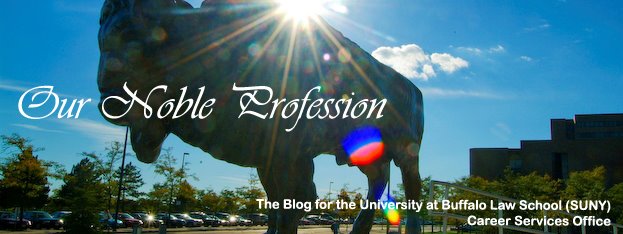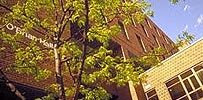"Education is the best means - probably the only means - by which nations can cultivate a degree of objectivity about each other's behavior and intentions... Educational exchange can turn nations into people, contributing as no other form of communication can to the humanizing of international relations." ~Senator J. William Fulbright

What a great experience for people who are interested in international work! Here's an overview of the program, from the UB Fulbright page.
The U.S. Congress created the Fulbright Program in 1946, immediately after World War II, to foster mutual understanding among nations through educational and cultural exchanges. Senator J. William Fulbright, sponsor of the legislation, saw it as a step toward building an alternative to armed conflict. Today, the Fulbright Program is the U.S. Government's premier scholarship program. It enables U.S. students and artists to benefit from unique resources in every corner of the world. It enables U.S. citizens to gain international competence in an interdependent world. Each year the Fulbright Program allows Americans to study or conduct research in over 140 nations. The Fulbright Association is a private, non-profit membership organization of Fulbright alumni and friends. (This site has links to other international grant opportunities.)The U.S. Department of State's Bureau of Educational and Cultural Affairs is the principal administrator of the Fulbright Program worldwide. The Institute of International Education (IIE) assists in the conduct of the program at both predoctoral and postdoctoral levels.
I am posting this article written by Emily Conley, UB Law '08 who went through the Fulbright application process this year. She has since been named a Presidential Management Fellow (I will be asking her to post about that too!) but she had some great tips for applying for the Fulbright!
Applying for the Fulbright Program, by Emily Conley
If you are interested in becoming a Fulbright Scholar the first thing that you should do is familiarize yourself with the program by checking out the Fulbright website at http://www.iie.org/Template.cfm?section=Fulbright1 or http://www.fulbrightonline.org/ (US Student Programs are the ones that are most likely going to be applicable to you.)
If you are interested in applying to the Fulbright Program and do not currently have a preference regarding the country or the region where you want to do your research you might want to look at the Competition Statistics Page (http://us.fulbrightonline.org/thinking_competition.html) to help you zone in on a country or region. If you are pretty open to where you are willing to go then it might behoove you to consider countries that are a bit off the beaten path so that the odds are more in your favor. For example, in 2007 almost 100 people applied to do research in Australia and Australia only had 12 positions available. Granted, there is pretty stiff competition for spots in every country and there is no way to “beat the odds” by selecting a country in which no one else is interested; however, it is a good idea to start off by seeing what you’re up against.
Another good resource to look at when you’re getting started is the Participating Country Summary page (http://us.fulbrightonline.org/thinking_country.html). This page links you into all participating countries’ individual webpages detailing their requirements.
Language is something that is really important to think about when applying for Fulbright ( are you going to go someplace where you already speak the language, if you go someplace where you do not speak the language is there a program in place to help you learn it). A number of countries participate in the Critical Language Enhancements Award program where you can essentially be awarded extra time in country to study a language that has been designated “critical”. There is a specific list of Critical Languages so you might want to see if you can incorporate one of them into your program. Note: each country that participates in the Critical Language Program has different requirements regarding the amount of study that you must complete before arriving in the country so you’re going to want to make sure that you can meet those requirements.
Once you have narrowed down your country selection you are going want to start thinking about your project – what is it that you want to research? Once you have a topic think about how you are going to go about conducting your research and what your results are going to look like? Are you going to be passing out surveys to locals, attorneys and judges, or are you going to be going through government records? Are you going to have information that you are going to be able to chart on a graph, a collection of stories, etc. Conceptualize your project and then explain it to a few people and get their feedback.
Now that you have a country and a project and a plan you might want to look into organizations in the country of your choice that can help to support your project. From what I have heard – it will carry a lot of weight if you can get a letter of recommendation from someone in country that is interested in working with you on your project. This is going to take a little bit of work – but with the internet it is manageable.
When you are putting your Fulbright application together, make sure to talk about it with your friends and professors because you never know who might have contacts that can help you out. For example, you might decide that you want to go to Bangladesh and two days before the application is due you might find out that you have a friend who has an aunt living in Buffalo who speaks Bengali and is willing to tutor you – and the addition of a letter from your potential tutor is going to carry some weight during the application process.
Technically, you are supposed to apply to the Fulbright Program through the University of Buffalo Fulbright Office (http://www.fulbright.buffalo.edu/) through Professor Patrick McDevitt. The first thing to do is to schedule an appointment with him (mcdevitt@buffalo.edu.). The internal UB deadline is in September. However, if for some reason you are unable to do so because you miss the deadline or they reject your application you will still be able to apply as an at-large candidate.
Applying for the Fulbright program is a bit of work; however, being a scholar would open up a great deal of doors to you so do not be deterred by the amount of work that you are going to have to put into your application. I STRONGLY suggest that you consult with as many people as possible while you are putting your application together because their feedback is going to help you to tighten up your application and make it much stronger in the end.
If you have any questions – please feel free to email them to me (egconley@buffalo.edu).
Good Luck!!









